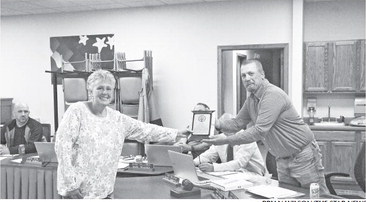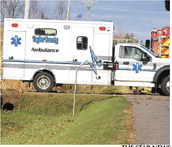Medford School Board eyes options to try to reduce long-term costs


Hindsight is often the only reliable judge on if something is an investment or a gamble.
Like many other employers, Medford Area Public Schools has seen everincreasing costs for health insurance coverage and school leaders are looking at ways to stop that trend. This past summer, the school board and its consultants explored the idea of going with a self-insurance model. However given the insurance claims history of the district, this was found to not be a practical solution at this time not giving enough potential cost savings to make it worth the risk.
After laying self-insurance to rest last month, at Monday night’s school board meeting board members discussed a proposal to create a hybrid model that would include traditional insurance but also incentivize people for using independent provider Taylored Family Care Clinic. Under the plan, those on the district’s insurance would pay a $50 copay for visits at Taylored Family Care Clinic with the district committing to paying the remaining cost to the provider. In addition the $50 copay would count toward the individual’s insurance deductible.
Jake Brehm, director of operations at Taylored Family Care Clinic, estimated that based on the projected level of usage with other employers in the area, this would have a cost of about $300,000 for the district.
A survey of on-site district staff showed more than 70% in favor of such a proposal. A similar survey of the Rural Virtual Academy staff was less favorable primarily due to the teachers and staff in the virtual school being located outside of the Medford area.
The district had initially hoped to work with Security Health Plan (SHP) in folding the option for Taylored Family Care Clinic into the renewal, but according to Cory Tothe-Lapointe of Spectrum Benefit Solutions, who works with the school district on health insurance, this is not something SHP was interested in doing.
Instead, SHP agreed to provide a retroactive premium credit to the 2025 renewal based on the usage at Taylored Family Care Clinic if the district can provide that they can lower utilization with this model. She said SHP would not tell her what sort of credit they would be willing to give.
Comparable services often cost less between Taylored Family Care Clinic and Aspirus or Marshfield Clinic. This is primarily due to the Taylored Family Care Clinic having a pay-as-you go model rather than dealing with insurance billing.
SHP released their renewal numbers for the district with a 5.7% premium increase. Last year, the district paid $7,291,491 for insurance premiums, with a portion of that charged back to employees. The increase for next year will be $415,615 bringing the total to $7,707,106.
As part of this the district will have to raise deductibles for the lower-deductible plans to $1,600 for an individual and $3,200 for family to comply with federal rules in order to maintain having Health Savings Accounts.
The good news, is that in preparing the budget, the district had projected a 10% increase and had built that amount into the preliminary budget. The lower than anticipated premium increase will mean a savings of $313,534.
Tothe-Lapointe noted that some things have changed with the district’s health usage over the past month. While through August, the district had been at 81.45% loss ratio, it was currently at 87.1% with an additional claim over $100,000. Of the three claims over $100,000, two are expected to go over $200,000 by the end of the year with one expected to be close to $300,000.
Despite the school district’s health insurance pool having 1,060 individuals covered, a small handful of high claims can make a major impact.
The loss ratio is the difference between what a group pays into the insurance premiums and what is paid out in claims. The hope is that through reducing the cost of routine doctor’s visits, the district would be able to drop its loss ratio.
Under the plan to use this year’s budgetary savings to subsidize district employees the risk is that any future concession they may get from SHP may not be worth the amount spent. Likewise, the district could be on the hook for more expenses if those going to Taylored Family Care Clinic needed additional services which normally would have been billed separately if going to a different provider but would be included under the $50 offi ce copay to incentivize staff to use the clinic.
“That is a pretty big roll of the dice,” said board member John Zuleger.
According to Tothe-Lapointe, the trend for large groups such as Medford School District is to see renewal increases between 6 and 8%. Board member Brian Hallgren said the Medford’s 5.7% is in line with that trend and doesn’t take into account anything they are doing to the good or bad.
“Past history would tell us that we have not been good,” Zuleger said.
Board member Don Everhard expressed concern that having a low capped cost for those going to Taylored Family Care Clinic would result in increased utilization and may end up costing the district more.
Brehm said one of the issues in recent years is that because people did not go to regular preventive care during COVID which led to things that would have been caught and addressed sooner not being caught until later.
Board president Dave Fleegel noted that in many cases people were urged to not go to the doctor unless necessary because healthcare systems were overloaded dealing with COVID. “It doesn’t take much motivation to stay home,” he said.
The big question for board members was if the potential to encourage people to use lower-cost providers such as Taylored Family Care would have long-term benefits for the district’s healthcare costs.
“It is the long game,” Zuleger said. The idea is that this could be the step toward making a self insurance model make sense for the district down the line.
“I see it as a way to ditch them down the road,” Zuleger said of making the investment now to get a good history of people going to independent providers.
Other insurance discussions centered around the deductibles and if the district should continue to offer a high deductible option. It was noted that there are about 60 families and 21 singles on the high deductible option. The concern is if they were switched to a lower deductible option they could be higher utilization.
Hallgren said he wanted to see what the premium impact would be if the district switched the low deductible from $1,600/$3,200 to $2,000 for singles and $4,000 for families.
“I can look at any plan design options you wish,” Tothe-Lapointe said.
District administrator Pat Sullivan said that while they did not need to make a decision at Monday’s meeting, they should make a decision sooner rather than later. “I think the sooner we can get an answer to employees the better,” he said.
Zuleger said the question is if the district takes the 5.7% rate increase and either puts the savings toward something else or investing in the future.
“I feel like we are kicking the can down the road,” Everhard said of delaying action.
“We don’t know what those numbers are,” Hallgren said of the potential for savings from using Taylored Family Care. He also said there needs to be more information for possible Health Savings Account changes. “The district is taking the risk here. This is either going to be a good deal, a break even or a really bad idea,” Hallgren said.
He noted that none of the other players were taking substantial risk and that the employees aren’t taking much of a risk either.
Fleegel gave a word of caution. He said he has been on the board when they have gotten 20% increases. “5.7% is still not a bad renewal in the world of health insurance,” he said.
No action was taken and it will come back to the October board meeting with the additional information requested by board members.
Call for changes
Dwayne Parkinson, a parent of students in the school, says the district isn’t doing enough to address bullying in the school buildings and has an over-reliance on victim-initiated reporting.
Parkinson specifically addressed concerns regarding an incident involving his son at Medford Area Elementary School last school year where he says his son was punched in the head and kicked.
This is not the first time Parkinson has spoken to the school board on this topic. He said the last time he was there was data gathering to find the answer to why his son faced the same punishment for missing an assignment as the student who hit his son. “It wasn’t handled very well,” Parkinson said of the incident and the subsequent issues with his concerns with the district.
At that meeting, Parkinson had filed 12 open records requests and said he has gotten all the information he requested back. “I can now confirm they exceed authority,” Parkinson said, stating district staff lied to him. “They made up stuff about my kids,” he said.
Parkinson cast doubt on the school district’s statistics regarding bullying incidents because they require the victims of bullying to initiate any sort of investigation. “We have a problem with under reporting,” he said. He gave the example of his son who told him that nothing is ever done to address the problem. He said this is something that is learned by the students and by the bullies themselves. He said the process isn’t working.
He said the next step they need to do is to develop a problem statement as part of the process to address the problem. He called on the school board to help to get that problem statement refined.
Parkinson spoke during the public comment period and there was no action taken by the board.
In other business, board members:
Received an update on the start of the school year in each building. Building administrators reported a smooth start to the school year.
Approved second reading of policy review for Buildings and Grounds, Accident Reports, Pool Operation, Staff/ Student Death, and Memorials. There were relatively minor revisions with grammatical and language changes.
Approved, after discussion on if handbook changes should go through policy committee, changes to the employee handbook to revamp the mentor pay policy and raise the amount for the threeyear mentors for new staff and create a curriculum mentorship for a teacher within a new teacher’s coverage area getting additional funds to assist them during the first year.



